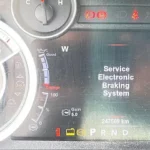When encountering a Mitsubishi P1773 code, it may leave you wondering what it means for your vehicle. This diagnostic trouble code (DTC) indicates a malfunction in the ABS system that’s outside the range of the enhanced OBD system’s field of vision. In many cases, it can be related to a faulty ABS speed sensor, which is a common issue in certain Mitsubishi models like the 2007 Outlander.
Understanding this code can help you address the issue effectively. To properly diagnose and resolve the P1773 code, you’ll want to consult with a professional mechanic or a Mitsubishi specialist. They can thoroughly examine your vehicle and determine the best course of action to ensure your car remains safe and reliable on the road.
Meaning of P1773
P1773 is a diagnostic trouble code that typically indicates a malfunction in your vehicle’s ABS (Anti-lock Braking System) when it is connected to the CVT (Continuously Variable Transmission). As a friendly reminder, it’s important to address this issue to ensure the safe and proper function of your vehicle.
The most common cause for the P1773 code is a problem with one or more ABS sensors. These sensors play a crucial role in monitoring wheel speed and helping your vehicle maintain traction in various driving conditions. While there could be other reasons for this code appearing, it’s essential to start by inspecting the ABS sensors.
To help diagnose and possibly resolve the problem, here are a few steps to consider:
- Perform a visual inspection: Check each ABS sensor for visible damage or loose connections. Pay specific attention to the right rear and left front sensors, as these are known to be more prone to failure on Mitsubishi Outlander models.
- Conduct a professional diagnostic: If the visual inspection doesn’t reveal any obvious issues, it’s recommended to consult a professional mechanic who can perform a comprehensive diagnostic of your vehicle’s ABS system. They may use specialized tools to pinpoint the precise cause of the problem to ensure an accurate repair.
- Replace or repair the faulty components: Based on the diagnostic results, you may need to replace one or more of the ABS sensors or address other related issues. Once the appropriate replacements or repairs are completed, your vehicle should be back in good working condition.
Always keep in mind that troubleshooting and repairing your vehicle’s ABS system can be complex and might require the expertise and equipment of a professional mechanic. While taking your car to a professional might have some cost, it’s essential to prioritize the safety and functionality of your vehicle.
Possible Causes and How to Fix
Faulty Clutch Pressure Control Solenoid Valve
A common cause of the Mitsubishi P1773 code is a faulty clutch pressure control solenoid valve. This valve is responsible for regulating the hydraulic pressure in your transmission, which is crucial for smooth gear changes. If the valve is not functioning correctly, it can lead to the P1773 code. To fix this issue, you’ll need to replace the faulty solenoid valve.
Wiring and Harness Issues
Another possible cause of the P1773 code is an issue with the wiring or the harness of the clutch pressure control solenoid valve. Open or shorted wiring can prevent the proper function of the valve, resulting in the P1773 code being triggered. To fix this problem, inspect the wiring and harness for any signs of damage or wear, and repair or replace them as necessary.
Poor Electrical Connection
A poor electrical connection in the clutch pressure control solenoid valve circuit is another possible cause of the P1773 code. This can be due to corrosion, dirt, or loose connections. To address this issue, disconnect your vehicle’s battery, and inspect all electrical connections related to the clutch pressure control solenoid valve. Clean any debris or corrosion, and make sure all connections are tight and secure.
By addressing these possible causes of the P1773 code, you can successfully diagnose and repair the problem with your Mitsubishi vehicle. Keep in mind to work safely, and if you’re unsure about any step in the process, consult a professional mechanic for assistance.
Symptoms and Indications
Engine Light On
When encountering a Mitsubishi P1773 code, one of the first symptoms you might notice is the engine light on or service engine soon warning light. This light indicates that there is a malfunction within the vehicle’s systems. Don’t panic – this warning light is a signal that something is wrong, but it doesn’t necessarily mean that it’s a major issue. Still, it’s essential to address the problem as soon as possible to avoid any potential safety concerns or further damage.
ABS Warning Light
Another indication of a Mitsubishi P1773 issue is the appearance of the ABS warning light on your dashboard. This light signals a problem within the ABS (Anti-lock Braking System), which is responsible for preventing your wheels from locking up during heavy braking. In many cases, this can be traced back to a faulty ABS speed sensor, specifically the right rear or left front sensors, as they are known for failure on certain Mitsubishi models.
Safety Concerns
While a P1773 code itself might not seem like a significant issue, it can lead to various safety concerns if left unaddressed. Without a properly functioning ABS, your vehicle’s braking system may not respond adequately in emergency situations. This could result in decreased control over your car and an increased risk of collisions.
Moreover, the malfunction of ABS sensors may cause other systems in your vehicle, like the transmission or stability control, to function improperly. This can also affect your driving safety, as well as the overall performance and reliability of your Mitsubishi.
While the symptoms of a Mitsubishi P1773 issue may not always be immediately noticeable, it’s crucial for your safety to address the problem as soon as possible. By paying attention to warning lights on your dashboard and seeking professional assistance when necessary, you can keep your vehicle running efficiently and maintain a safe driving experience.
Cost and Labor
When dealing with the Mitsubishi P1773 code, you might be interested in the potential costs and labor involved in diagnosing and resolving the issue. Here, we will provide a brief overview of the process to help you understand what to expect.
To diagnose the P1773 code, you will generally need to visit a professional auto repair shop. These shops typically charge between $75 and $150 per hour for their services. Depending on the complexity of your vehicle’s issue, diagnosing the problem could take a considerable amount of time.
The labor associated with the P1773 code can vary, but on average, it might take around 1 hour to properly diagnose and resolve the issue. Keep in mind that this is just a rough estimation, and the actual labor time might differ based on the specific circumstances and the expertise of the mechanic working on your vehicle.
In terms of cost, diagnosing the P1773 code at an auto repair shop might be a little expensive, but it is essential to get an accurate assessment of the problem. Once the issue is correctly identified, you can move forward with a clear understanding of the required repair work, as well as an accurate estimate of the associated costs.
To sum up, addressing the Mitsubishi P1773 code will require some financial investment and time commitment. However, by seeking professional help and understanding the labor and cost expectations, you will be well-equipped to resolve the issue and get your vehicle back on the road in a friendly and efficient manner.















